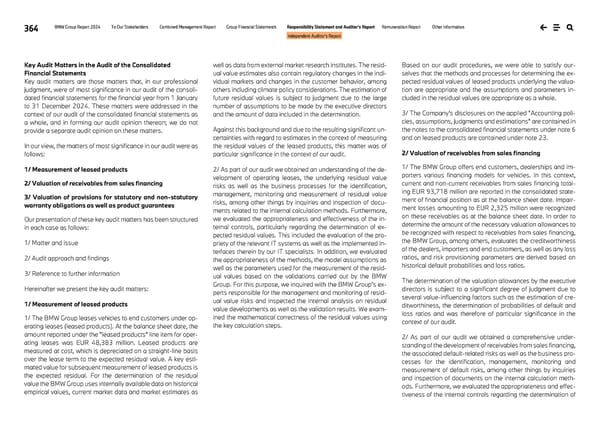364 BMW Group Report 2024 To Our Stakeholders Combined Management Report Group Financial Statements Responsibility Statement and Auditor’s Report Remuneration Report Other Information Independent Auditor’s Report Key Audit Matters in the Audit of the Consolidated Financial Statements Key audit matters are those matters that, in our professional judgment, were of most significance in our audit of the consoli- dated financial statements for the financial year from 1 January to 31 December 2024. These matters were addressed in the context of our audit of the consolidated financial statements as a whole, and in forming our audit opinion thereon; we do not provide a separate audit opinion on these matters. In our view, the matters of most significance in our audit were as follows: 1/ Measurement of leased products 2/ Valuation of receivables from sales financing 3/ Valuation of provisions for statutory and non-statutory warranty obligations as well as product guarantees Our presentation of these key audit matters has been structured in each case as follows: 1/ Matter and issue 2/ Audit approach and findings 3/ Reference to further information Hereinafter we present the key audit matters: 1/ Measurement of leased products 1/ The BMW Group leases vehicles to end customers under op- erating leases (leased products). At the balance sheet date, the amount reported under the "leased products" line item for oper- ating leases was EUR 48,383 million. Leased products are measured at cost, which is depreciated on a straight-line basis over the lease term to the expected residual value. A key esti- mated value for subsequent measurement of leased products is the expected residual. For the determination of the residual value the BMW Group uses internally available data on historical empirical values, current market data and market estimates as well as data from external market research institutes. The resid- ual value estimates also contain regulatory changes in the indi- vidual markets and changes in the customer behavior, among others including climate policy considerations. The estimation of future residual values is subject to judgment due to the large number of assumptions to be made by the executive directors and the amount of data included in the determination. Against this background and due to the resulting significant un- certainties with regard to estimates in the context of measuring the residual values of the leased products, this matter was of particular significance in the context of our audit. 2/ As part of our audit we obtained an understanding of the de- velopment of operating leases, the underlying residual value risks as well as the business processes for the identification, management, monitoring and measurement of residual value risks, among other things by inquiries and inspection of docu- ments related to the internal calculation methods. Furthermore, we evaluated the appropriateness and effectiveness of the in- ternal controls, particularly regarding the determination of ex- pected residual values. This included the evaluation of the pro- priety of the relevant IT systems as well as the implemented in- terfaces therein by our IT specialists. In addition, we evaluated the appropriateness of the methods, the model assumptions as well as the parameters used for the measurement of the resid- ual values based on the validations carried out by the BMW Group. For this purpose, we inquired with the BMW Group's ex- perts responsible for the management and monitoring of resid- ual value risks and inspected the internal analysis on residual value developments as well as the validation results. We exam- ined the mathematical correctness of the residual values using the key calculation steps. Based on our audit procedures, we were able to satisfy our- selves that the methods and processes for determining the ex- pected residual values of leased products underlying the valua- tion are appropriate and the assumptions and parameters in- cluded in the residual values are appropriate as a whole. 3/ The Company's disclosures on the applied "Accounting poli- cies, assumptions, judgments and estimations" are contained in the notes to the consolidated financial statements under note 6 and on leased products are contained under note 23. 2/ Valuation of receivables from sales financing 1/ The BMW Group offers end customers, dealerships and im- porters various financing models for vehicles. In this context, current and non-current receivables from sales financing total- ing EUR 93,718 million are reported in the consolidated state- ment of financial position as at the balance sheet date. Impair- ment losses amounting to EUR 2,325 million were recognized on these receivables as at the balance sheet date. In order to determine the amount of the necessary valuation allowances to be recognized with respect to receivables from sales financing, the BMW Group, among others, evaluates the creditworthiness of the dealers, importers and end customers, as well as any loss ratios, and risk provisioning parameters are derived based on historical default probabilities and loss ratios. The determination of the valuation allowances by the executive directors is subject to a significant degree of judgment due to several value-influencing factors such as the estimation of cre- ditworthiness, the determination of probabilities of default and loss ratios and was therefore of particular significance in the context of our audit. 2/ As part of our audit we obtained a comprehensive under- standing of the development of receivables from sales financing, the associated default-related risks as well as the business pro- cesses for the identification, management, monitoring and measurement of default risks, among other things by inquiries and inspection of documents on the internal calculation meth- ods. Furthermore, we evaluated the appropriateness and effec- tiveness of the internal controls regarding the determination of
 BMW Group Report 2024 Page 363 Page 365
BMW Group Report 2024 Page 363 Page 365